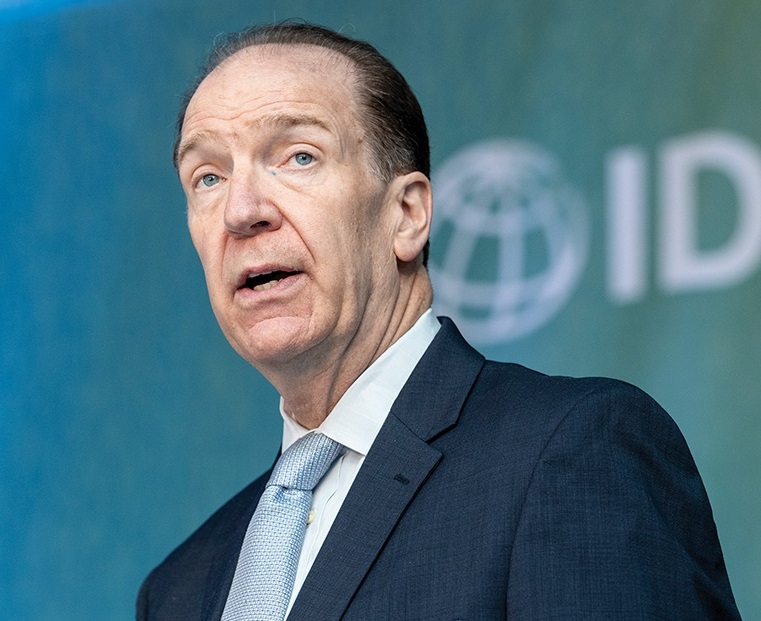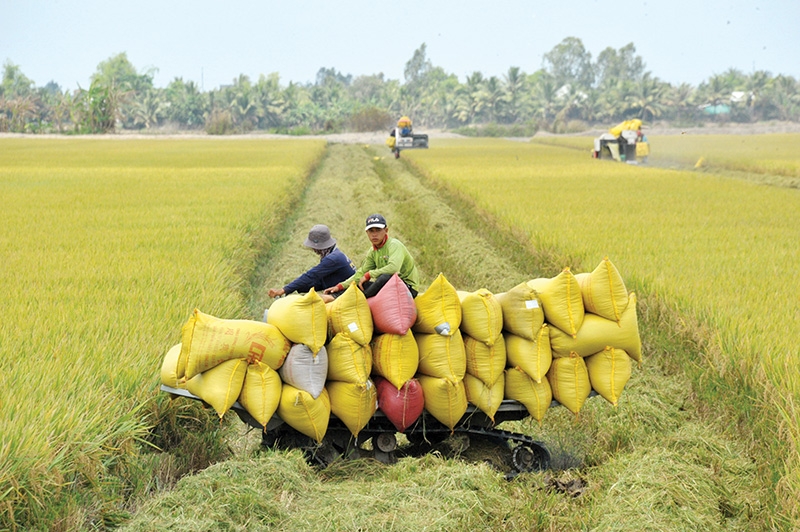Defining the difficult choices of our age
 |
| By David Malpass - President, World Bank Group |
Unfortunately, the delays in beginning the vaccination process in developing countries are deepening global inequality and leaving hundreds of millions of elderly and vulnerable at risk.
Beyond the pandemic’s immediate harm, COVID-19 is leaving lasting scars: children missing vital schooling and related childhood nutrition and vaccination programmes; businesses collapsed with job skills lost; savings and assets depleted; and debt overhangs depressing investment and preventing urgent social spending.
The World Bank has moved quickly to help countries respond in three steps – emergency health programmes in more than 100 countries early in the crisis; vaccination readiness assessments completed in over 140 countries by the end of 2020; and COVID-19 vaccination financing and delivery operations that will reach at least $4 billion of commitments in 50 countries by mid-year. The International Finance Corporation, our private sector development arm, is helping to increase the supply of vaccines and critical health equipment.
Widely-available vaccination is the best investment to strengthen the recovery, and I have repeatedly urged countries with sufficient vaccine supplies to release them as soon as possible to developing countries with delivery programmes in place. In addition to vaccination programs, we’re working to focus our financing and expertise on impactful programmes that will save lives and livelihoods, while supporting green, resilient, and inclusive development. The developing world needs sustainable growth that is broad-based and strong enough to lift hundreds of millions of families out of poverty, while integrating both development and climate.
To help countries address climate-related goals, the World Bank Group will commit at least 35 per cent of our financing over the next five years – totalling $100 billion – to support developing country climate investments. More important than the amount spent is the results. To address current needs, part of our climate financing will be used for high impact mitigation efforts to reduce greenhouse gas emissions (GHG), particularly by large emitters.
 |
| The World Bank is helping countries achieve constructive change and sustainable development |
Looking towards the future, at least half of our total climate finance will be for high impact adaptation efforts, to help countries prepare for harmful climate effects. Our focus on adaptation recognises the reality that climate change hits the poorest countries hardest, even though their contribution to GHG emissions is minimal.
One of our immediate actions is helping countries with their nationally determined contributions and long-term low carbon development plans. Countries have widely varying approaches to Paris alignment, and it is important that their climate efforts maximise impact on both GHG emissions and successful adaptation.
Adding to inequality, many of the poorer countries are coping with record debt burdens that charge high interest rates, even as rates in advanced economies stay near zero. Even before the pandemic, half of all low-income countries were already in debt distress or at a high risk of it. When the pandemic struck, I called for debt relief for the poorest countries starting with an immediate moratorium on debt service. The G20’s Debt Service Suspension Initiative provided temporary relief for 43 countries to postpone around $5.7 billion in debt-service payments between May and December of 2020, with further payment deferrals of $7.3 billion possible in the first half of 2021.
The relief has been less than anticipated because not all creditors participated in the initiative – these non-participating creditors continued to collect billions of US dollars in interest and principal payments during the crisis – and because debtor countries will also owe the suspended payments, plus interest, when the suspension period ends in December.
In April, the G20 announced a common framework under which countries with unsustainable debt burdens could achieve a moderate debt position. Working with the International Monetary Fund, we are supporting the implementation but many of the sovereign debt contracts made in recent years contain provisions that make debt analyses and restructurings difficult, including collateralisation, non-disclosure clauses, and impediments to comparable treatment. History shows that countries with no way out of overhanging debt burdens don’t grow and do not achieve lasting reductions in poverty.
The policy imbalance in fiscal and monetary stimulus is another important contributor to inequality, both within and among countries. Fiscal stimulus and pandemic-related support measures are concentrated in the advanced economies, and these efforts are failing to help people in the developing world. We can see this as prices spike – driven by demand in advanced economies – even as food insecurity hits huge swaths of the world’s poor. Global monetary policy suffers from an even greater imbalance because central bank bond-buying and credit regulation direct resources to only the safest, most sophisticated institutions, crowding out other borrowers.
Our collective response to poverty, inequality, and climate change will be defining choices of our age. The challenges are immense, requiring new approaches in both developing countries and advanced economies. The World Bank Group is dedicated to helping countries achieve constructive change and sustainable development as we work with the public and private sectors toward our core mission of alleviating poverty and boosting shared prosperity.
| Since COVID-19 hit Vietnam in early 2020, the World Bank Group has worked with Vietnam on multiple fronts of the national response strategy from health crisis management to fostering a resilient recovery. A grant from the Pandemic Emergency Financing Facility, helped ramp up testing capacity for 84 laboratories nationwide, cutting the turnaround time from 24-48 hours to 4-6 hours. The World Bank provided advice to the government through a series of policy notes on strategies to protect vulnerable groups from the negative impacts of the pandemic and also stimulate a broad-based recovery. The diagnostic and recommendations contributed to Vietnam’s successful containment of COVID-19 outbreak, while managing to post a positive GDP growth. Source: World Bank in Vietnam |
| Tran Quoc Phuong - Deputy Minister of Planning and Investment
The pandemic is affecting parts of the country again, with thousands of positive cases of coronavirus. However, through the government’s dual targets, it has been managing the health crisis as well as retaining economic development as much as possible. Standard & Poor has announced adjustment of Vietnam’s outlook to positive, while Fitch and Moody’s had both already reported a positive outlook. This is recognition of Vietnam’s economic development achievements and policy reforms amid the pandemic situation, and reaffirms the necessity of the dual targets. The government asks all relevant personnel to fight against the coronavirus more scientifically, trace more quickly, isolate more speedily, and vaccinate in a more widespread manner in order to keep the economy from stagnating. This is why, although the number of cases is much more than previous outbreaks, we have yet to apply social distancing for the whole country or even an entire province. This has contributed significantly to reducing difficulties for enterprises to retain their production lines and business. The issuance of the Resolution No.09/NQ-CP dated May 18 on purchasing COVID-19 vaccines is necessary and reflects the timely movement of the government to fight against the pandemic, as well as strengthen the belief of the people and enterprises on the determination of the government. At this time, vaccinations are the best solution to mitigate the impacts of the pandemic on the economy. However, the dual targets of the government are still being applied for most effectiveness by isolating the smallest areas possible to ensure manufacturing activities for as many factories as possible. With the drastic solutions to fight against COVID-19, the infection has generally been managed well and I think and hope that industrial zones may resume at full force soon. |
What the stars mean:
★ Poor ★ ★ Promising ★★★ Good ★★★★ Very good ★★★★★ Exceptional
Related Contents
Latest News
More News
- Bac Ai Pumped Storage Hydropower Plant to enter peak construction phase (January 27, 2026 | 08:00)
- ASEAN could scale up sustainable aviation fuel by 2050 (January 24, 2026 | 10:19)
- 64,000 hectares of sea allocated for offshore wind surveys (January 22, 2026 | 20:23)
- EVN secures financing for Quang Trach II LNG power plant (January 17, 2026 | 15:55)
- PC1 teams up with DENZAI on regional wind projects (January 16, 2026 | 21:18)
- Innovation and ESG practices drive green transition in the digital era (January 16, 2026 | 16:51)
- Bac Ai hydropower works stay on track despite holiday period (January 16, 2026 | 16:19)
- Fugro extends MoU with PTSC G&S to support offshore wind growth (January 14, 2026 | 15:59)
- Pacifico Energy starts commercial operations at Sunpro Wind Farm in Mekong Delta (January 12, 2026 | 14:01)
- Honda launches electric two-wheeler, expands charging infrastructure (January 12, 2026 | 14:00)


 Tag:
Tag:




















 Mobile Version
Mobile Version